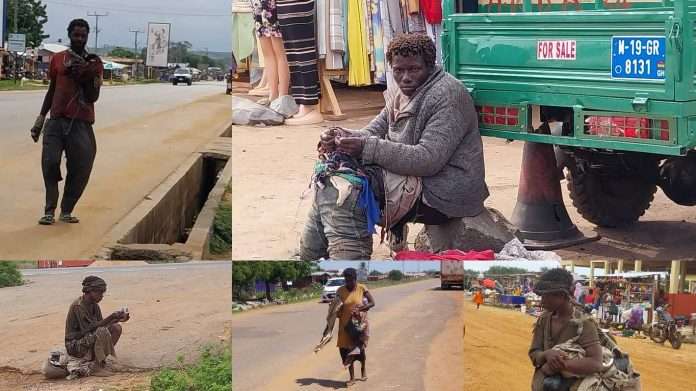Sege Now Flush Point Of Persons With Mental Disorders
Poor mental health can also account for violence, drug trafficking, child abuse, pedophilia, suicide, crime, and other social vices. Over five hundred (500) mentally-ill patients are currently roaming the streets of Accra, Tema, and some other parts of the Greater Accra region.
Mental healthcare is becoming a critical concern in Ghana but the country is still straining to attend to mental health needs of suffering and stigmatized citizens who the most vulnerable the in society.
They are often subject to discrimination, social isolation and exclusion, human rights violations, and an ancient demeaning stigma that leads to bereavement of social support, self-reproach, or the decaying or straining of important relationships.
Even though mental health is becoming a serious international health concern, many nations, specifically third world countries struggle to address the menace with the inadequate amount of resources being funneled into the non-physical sector of health.
Consequences of poor mental health also include being predisposed to a variety of physical illnesses, having a reduced quality of life, fewer opportunities for income, and having lower individual productivity which affects the total national output.
Poor mental health can also account for violence, drug trafficking, child abuse, pedophilia, suicide, crime, and other social vices. Over five hundred (500) mentally-ill patients are currently roaming the streets of Accra, Tema, and some other parts of the Greater Accra region.
An estimated three-point-one million Ghanaians representing10 percent of the estimated 31 million population of Ghana, have one form of mental disorder or another, with 16,000 having severe cases. Sourcing the data from the World Health Organisation, WHO, and the Ghana Mental Health Authority indicate that 41 percent of Ghanaians have psychological distress which is mild, moderate, or severe which costs the nation a 7 percent Growth Domestic Products loss.
Mental health problems can be categorized into four groups, those on the street, those at treatment facilities, like the psychiatric and general health facilities, those in the traditional and faith healing centres, and those in their houses and organisations who do not recognize their mental health illness, or who recognise but are not doing anything about it.
In view of this, Sege, the capital of the Ada West District in the Greater Accra region of Ghana is noted to host a high number of mentally-ill patients roaming the streets of the community causing public obstruction and nuisance to pedestrians, motorists, and traders.
Most of these mentally ill people are commonly seen on and along the main trans-ECOWAS highway carrying plastic materials and other forms of rubbish in attempts to cross the Accra-Aflao highway.
Some residents of the community speaking with the Ghanaianvoiceonline.com raised concern about the security threat these neglected mentally derailed persons pose to them.
Some of the interviewees criticized the Ada West District Assembly for not helping matters.
An officer of the District Assembly who spoke on condition of anonymity said most of these mentally retarded patients are transported and dumped in the Sege community at dawn by unknown people, adding that most of them cannot even speak the local dialect. She also attributed the challenge to the lack of funds by the Assembly to rehabilitate and integrate them, saying generally there is a need for systematic funding for such an exercise.
She told this portal that to be able to raise money to deal with such a problem, the Mental Health Levy captured in the Mental Health Act, 2012 (Act 846), must be operationalized to generate the needed funds to tackle the situation. She further explained that it was a systematic failure because the country’s mental health system is underresourced, hence inability to attend to related issues.
“Our social welfare system is inadedequately funded to respond to people who need support. Also, the situation is compounded by a breakdown in the nuclear and extended family systems, compromising the ability to support people who require care in such circumstances” she retorted.
She to this end underscored the need for more attention to be paid to mental health regardless.
According to the Sege residents, such persons do not only litter the streets, as they carry varrying rubbish, including empty cans, plastic bottles, and waste papers, but also pose danger to pedestrians, since some carry sticks and other offensive weapon along.
Some of the residents said although the government had an obligation to deal with the challenge, individual families also had a role to play in caring for their relatives who exhibit sings of mental unsundness before their situations deterriorate. This they added can be done by supporting such persons at the earlier stages, to enable them to undergo treatment before their condition become worse.
The concerned residents therefore appealed to the Ada West District Assembly and the Social Welfare Department as well as well-meaning Ghanaians to help remove mentally ill people on the streets of Sege which is a security threat.
by: Ghanaianvoiceonline.com


